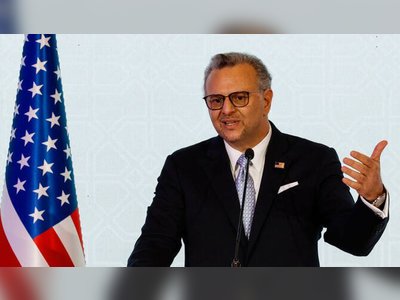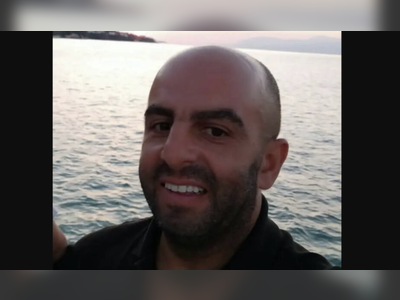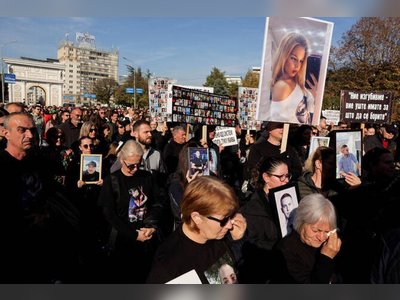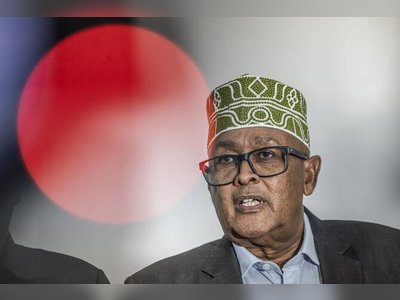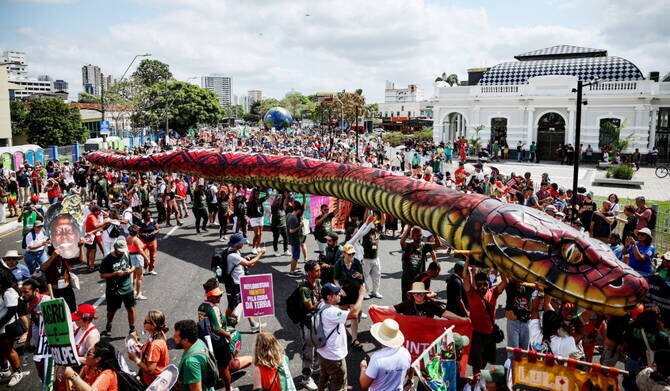
Climate Protesters Demand Action at COP30 with Colorful Costumes and Drums
Thousands of environmental activists march through Belem, Brazil, to pressure world leaders during the UN climate talks.
BELEM, Brazil: Climate protesters from various environmental and social movements marched through Belem on Saturday, demanding action from world leaders as the halfway point of the annual United Nations climate talks, COP30, unfolded.
The demonstrators, clad in distinctive costumes symbolizing their causes, chanted, waved flags, and carried signs during the approximately 4-kilometer procession that passed near the main venue.
Organizers used sound systems mounted on trucks to direct protesters.
Among them was Marisol Garcia, a Kichwa woman from Peru, who emphasized that the protest aimed to push world leaders toward making "more humanized decisions".
The protest included individuals dressed in black as a sign of mourning for fossil fuels and others clad in red to represent the blood of environmental defenders.
The marchers twice disrupted the COP30 proceedings earlier in the week by surrounding the venue, with security guards sustaining minor injuries during one incident.
Despite this, the atmosphere was described as vibrant and open compared to recent climate talks held in more authoritarian nations.
The turnout was significant, with thousands filling much of the procession's path.
Ana Heloisa Alves, a 27-year-old youth leader, expressed her excitement over the substantial attendance, stating that it made ignoring the protesters' message difficult.
Her group opposed plans by the Brazilian government to commercially develop the Tapajos River, asserting that the waterway belongs to the people.
Other demonstrators highlighted issues like the need for more popular participation in climate decision-making processes.
The United States, under President Donald Trump, chose not to participate in COP30, which focuses on advancing the landmark 2015 Paris Agreement aimed at limiting global warming.
A Brazilian demonstrator, Flavio Pinto, took a stance against the U.S., employing an oversized American flag top hat and fake hundred-dollar bills bearing Trump's image to symbolize his criticism of what he termed "imperialism" leading to environmental crises.
The march included women from the Interstate Movement of Coconut Breakers of Babaçu who marched carrying domed hats fashioned from Babaçu palm fronds, advocating for greater access to these trees on private lands.
The demonstrators formed a sea of red, white, and green flags as they ascended a hill, captivating bystanders who gathered to observe and photograph the scene.
The climate talks are scheduled through Friday, with expectations that while no major new agreements will be reached, progress might be made on previously promised commitments, particularly financial support for developing nations.
The demonstrators' presence underscores the ongoing global debate over climate change action.
The demonstrators, clad in distinctive costumes symbolizing their causes, chanted, waved flags, and carried signs during the approximately 4-kilometer procession that passed near the main venue.
Organizers used sound systems mounted on trucks to direct protesters.
Among them was Marisol Garcia, a Kichwa woman from Peru, who emphasized that the protest aimed to push world leaders toward making "more humanized decisions".
The protest included individuals dressed in black as a sign of mourning for fossil fuels and others clad in red to represent the blood of environmental defenders.
The marchers twice disrupted the COP30 proceedings earlier in the week by surrounding the venue, with security guards sustaining minor injuries during one incident.
Despite this, the atmosphere was described as vibrant and open compared to recent climate talks held in more authoritarian nations.
The turnout was significant, with thousands filling much of the procession's path.
Ana Heloisa Alves, a 27-year-old youth leader, expressed her excitement over the substantial attendance, stating that it made ignoring the protesters' message difficult.
Her group opposed plans by the Brazilian government to commercially develop the Tapajos River, asserting that the waterway belongs to the people.
Other demonstrators highlighted issues like the need for more popular participation in climate decision-making processes.
The United States, under President Donald Trump, chose not to participate in COP30, which focuses on advancing the landmark 2015 Paris Agreement aimed at limiting global warming.
A Brazilian demonstrator, Flavio Pinto, took a stance against the U.S., employing an oversized American flag top hat and fake hundred-dollar bills bearing Trump's image to symbolize his criticism of what he termed "imperialism" leading to environmental crises.
The march included women from the Interstate Movement of Coconut Breakers of Babaçu who marched carrying domed hats fashioned from Babaçu palm fronds, advocating for greater access to these trees on private lands.
The demonstrators formed a sea of red, white, and green flags as they ascended a hill, captivating bystanders who gathered to observe and photograph the scene.
The climate talks are scheduled through Friday, with expectations that while no major new agreements will be reached, progress might be made on previously promised commitments, particularly financial support for developing nations.
The demonstrators' presence underscores the ongoing global debate over climate change action.
